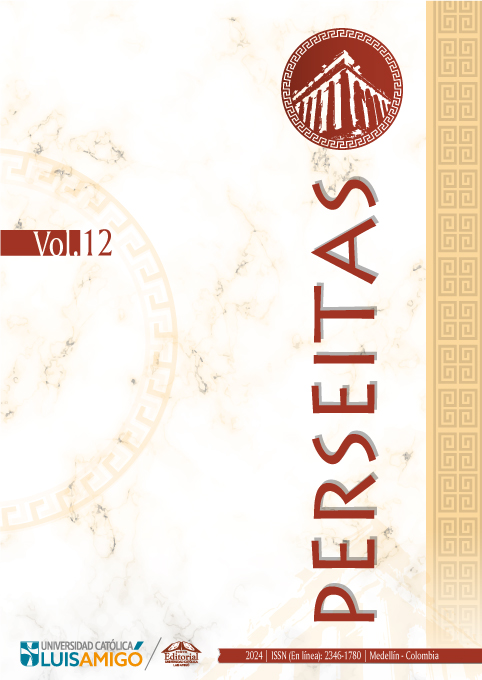Ideological unconscious, historical ethos and affect: the historical forms of individuality and the problematization of the baroque
DOI:
https://doi.org/10.21501/23461780.4805Keywords:
Baroque, Bolívar Echeverría, Capitalism, Fredric Jameson, Juan Carlos Rodríguez, Modes of subjectivation, SubjectAbstract
The article presents the studies of Juan Carlos Rodríguez (1993, 2017), Fredric Jameson (2013, 2015), and Bolívar Echeverría (1996, 1998) who address the emergence of Modernity, its impact on the sphere of culture and the subsequent constitution of a specific type of individuality. On the basis of certain key concepts, they offer an explanation of the relationship between the market economy that begins to emerge in the transition from feudalism to capitalism and certain dispositions that appear in certain cultural products to consider the individual as a freely self-determining subject, taking into account the fact that ideology manifests a constructive character. Analyzing similarities and differences, the text proposes a complementary reading of all of them, arguing that they refer, in original ways, to a common phenomenon.
Downloads
References
Althusser, L., & Balibar, É. (1973). Lire le Capital [Para leer El Capital]. Maspero.
Balibar, É. (1995). The Infinite Contradiction [La contradicción infinita]. Yale French Studies, 88, 142-164.
Benjamin, W. (2002). The Arcades Project [El Libro de los Pasajes]. The Belknap Press of Harvard University Press.
Beverley, J. (2008). Essays on the Literary Baroque in Spain and Spanish America [Ensayos sobre el barroco literario en España e Hispanoamérica]. Tamesis.
Eagleton, T. (2001). La idea de cultura. Paidós.
Eagleton, T. (2006a). Criticism and Ideology [Crítica e ideología]. Verso.
Eagleton, T. (2006b). La estética como ideología. Trotta.
Echeverría, B. (1996). El ethos barroco. Debate Feminista, 13, 67-87.
Echeverría, B. (1998). La modernidad de lo barroco. Ediciones Era.
Hobsbawm, E. (1988). En torno a los orígenes de la revolución industrial. Siglo XXI.
Hume, David. (2006). Ensayos políticos. Tecnos.
Jameson, F. (2004). Una modernidad singular. Ensayo sobre la ontología del presente. Gedisa.
Jameson, F. (1973). Vanishing Mediator: Narrative Structure in Max Weber [El mediador evanescente: estructura narrativa en Max Weber]. New German Critique, (1), 52-89.
Jameson, F. (1988). The Political Unconsicous. Cornell University Press.
Jameson, F. (2009). Arqueologías del futuro. Akal.
Jameson, F. (2010). Afterwards [Posfacio]. En Cole, A. y Smiths, D. Vance (Eds.). The Legitimacy of the Middle Ages. On the Unwritten History of Theory (pp. 243-246). Duke University Press.
Jameson, F. (2013). Las antinomias del realismo. Akal.
Jameson, F. (2015). Los antiguos y los posmodernos. Sobre la historicidad de las formas. Akal.
Jameson, F. (2019). Allegory and Ideology. Verso.
Laughlin, T. A. (2019). Crisis and Clarity: Fredric Jameson’s The Antinomies of Realism, Affect, and the Problem of Representing Totality Today [Crisis y claridad: Las antinomias del realismo de Fredric Jameson, el afecto y el problema de la representación de la totalidad en la actualidad]. Mediations, 32(2), 179-186.
Lezama Lima, J. (2005). La expresión americana. Fondo de Cultura Económica.
Marx, K. (2010). El capital (Tomo 1). Siglo XXI.
Meiksins Wood, E. (2012). Liberty and Property. A Social History of Western Political Thought from Renaissance to Enlightenment [Libertad y propiedad. Una historia social del pensamiento político occidental del Renacimiento a la Ilustración]. Verso.
Moreno Pestaña, J. L. (2022). Umbral y crepúsculo del sujeto burgués: Juan Carlos Rodríguez y el inconsciente ideológico del capitalismo. En Rodríguez, J. C. Freud: la escritura, la literatura (inconsciente ideológico e inconsciente libidinal) (pp. 5-30). Akal.
Pueyo Zoco, V. (2012). Sobre la categoría de “mediador evanescente”: pícaros, bufones y prostitutas en el umbral de la modernidad. Journal of Spanish Cultural Studies, 13(2), 149-165. https://doi.org/10.1080/14636204.2012.745320
Read, M. R. (2018). Explorations of the Political/Ideological Unconscious: Fredric Jameson and Juan Carlos Rodríguez [Exploraciones del inconsciente político/ideológico]. Mediations, 32(1), 71-94.
Rodríguez, J. C. (1993). La literatura del pobre. Comares.
Rodríguez, J. C. (2011). Tras la muerte del aura. (En contra y a favor de la Ilustración). Comares.
Rodríguez, J. C. (2017). Teoría e historia de la producción ideológica. Akal.
Rodríguez, J. C. (2022). Freud: la escritura, la literatura (inconsciente ideológico e inconsciente libidinal). Akal.
Shakespeare, W. (2016). Romeo y Julieta. Edición bilingue. Penguin.
Weber, M. (2001). La ética protestante y el espíritu del capitalismo. Alianza.
Published
How to Cite
Issue
Section
License

This work is licensed under a Creative Commons Attribution-NonCommercial-NoDerivatives 4.0 International License.
La revista y los textos individuales que en esta se divulgan están protegidos por las leyes de copyright y por los términos y condiciones de la Licencia Creative Commons Atribución-No Comercial-Sin Derivar 4.0 Internacional.
















